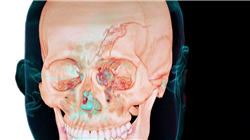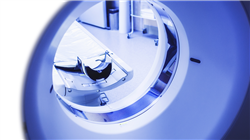University certificate
The world's largest faculty of nursing”
Description
Through this 100% online Postgraduate certificate, you will perform non-invasive evaluations with precision and efficiency, which will streamline the investigation process and guarantee the integrity of the body and the objectivity of the findings”

Radiodiagnostics plays a crucial role in Forensic Investigation by providing a detailed and accurate view of pathologies linked to court cases. Thanks to this technology, nurses can identify internal injuries, determine the cause of death and collect crucial evidence to solve cases. In addition, Radiodiagnosis allows a non-invasive evaluation, which reduces autopsy time and preserves the integrity of the body.
Therefore, this Postgraduate certificate is born, offering a comprehensive approach to identify a wide range of pathologies using various radiodiagnostic means. In this way, professionals will be able to interpret X-Ray images, Computed Tomography (CT), Magnetic Resonance Imaging (MRI) and other advanced techniques to detect internal injuries and anatomical anomalies relevant to Forensic Investigation.
Likewise, the program will enable graduates to perform an approach or issue an expert opinion. In fact, through case studies and simulated scenarios, they will develop critical skills to evaluate radiological images and correlate findings with clinical and forensic evidence. This ability to analyze and contextualize radiological information will be essential to effectively support criminal investigations and legal proceedings.
Finally, the importance of Radiodiagnostics as a supporting technique to individualize and thereby identify an individual in forensic cases will be emphasized. By learning to recognize unique features in radiological images, such as bone structures or medical implants, students will be able to contribute to the positive identification of victims and the resolution of cases.
In order to consolidate the understanding of the topics, this program implements the revolutionary Relearning approach, which consists of the optimal assimilation of the contents through the organic and gradual repetition of key concepts. In addition, the proposal will be enriched with a wide variety of multimedia resources, such as infographics and explanatory videos, presented in a virtual format for total adaptability to individual agendas.
Radiodiagnostics not only streamlines the investigative process, but also ensures objectivity and reliability of forensic findings. Take advantage of this unique opportunity offered by TECH!”
This Postgraduate certificate in Radiodiagnosis of Pathologies Related to Forensic Investigation contains the most complete and up-to-date scientific program on the market. The most important features include:
- The development of practical cases presented by experts in Radiodiagnosis of Pathologies Related to Forensic Investigation
- The graphic, schematic and eminently practical contents with which it is conceived gather scientific and practical information on those disciplines that are indispensable for professional practice
- Practical exercises where the self-assessment process can be carried out to improve learning
- Its special emphasis on innovative methodologies
- Theoretical lessons, questions to the expert, debate forums on controversial topics, and individual reflection assignments
- Content that is accessible from any fixed or portable device with an Internet connection
Radiodiagnostics will provide you with valuable guidance on the cause and manner of death, clarifying the circumstances surrounding traumatic events and homicides”
The program’s teaching staff includes professionals from the field who contribute their work experience to this educational program, as well as renowned specialists from leading societies and prestigious universities.
The multimedia content, developed with the latest educational technology, will provide the professional with situated and contextual learning, i.e., a simulated environment that will provide immersive education programmed to learn in real situations.
This program is designed around Problem-Based Learning, whereby the professional must try to solve the different professional practice situations that arise during the course. For this purpose, students will be assisted by an innovative interactive video system created by renowned and experienced experts.
You will acquire skills to correlate radiological findings with clinical and forensic findings, contributing to criminal investigations and judicial processes with accurate and relevant medical information"

You will interpret images from X-rays, CT scans, MRIs and other advanced techniques to detect internal injuries, bone fractures, internal bleeding and other abnormalities"
Syllabus
This Postgraduate certificate in Radiodiagnosis of Pathologies Related to Forensic Investigation will cover a wide range of content designed to provide nurses with a comprehensive understanding of how to use medical imaging techniques in the forensic context. Therefore, they will delve into fundamental topics, such as the interpretation of X-rays, CT scans, MRIs and other modalities, to identify traumatic injuries, medical pathologies and congenital anomalies relevant to criminal investigations and prosecutions.

You will delve into the correlation between radiological findings and forensic circumstances, including the orientation of cause and manner of death, individualization of subjects, and expert report writing”
Module 1. Radiodiagnosis of Pathologies Related to Forensic Investigation
1.1. Classification of Traumatic Fractures in the Forensic Context
1.1.1. Classification According to Skin Condition
1.1.2. Classification According to Location
1.1.3. Classification According to Fracture Trace
1.2. Stages of Bone Repair in the Forensic Context
1.2.1. Inflammatory Phase
1.2.2. Repair Phase
1.2.3. Remodeling Phase
1.3. Child Maltreatment and its Radiodiagnosis in a Forensic Context
1.3.1. Simple Radiography
1.3.2. Axial Tomography
1.3.3. Magnetic Resonance
1.4. Illegal Transport of Narcotics and Radiodiagnostics in a Forensic Context
1.4.1. Simple Radiography
1.4.2. Axial Tomography
1.4.3. Magnetic Resonance
1.5. Simple Radiographic Technique for Identification of Alterations within a Forensic Context
1.5.1. Cranial Pathologies
1.5.2. Thoracic Pathologies
1.5.3. Extremity Pathologies
1.6. Ultrasound Technique for Identification of Pathologies within a Forensic Context
1.6.1. Abdominal
1.6.2. Obstetric
1.6.3. Thoracic
1.7. Computed Tomography and Identification of Pathologies in a Forensic Context
1.7.1. Cranial
1.7.2. Thoracic
1.7.3. Abdominal
1.8. Magnetic Resonance Imaging and Pathology Identification in a Forensic Context
1.8.1. Cranial
1.8.2. Thoracic
1.8.3. Abdominal
1.9. Diagnostic Angiography in a Forensic Context
1.9.1. Cranial
1.9.2. Abdominal
1.9.3. Extremities
1.10. Virtopsia, Radiology in Forensic Medicine
1.10.1. MRI
1.10.2. Tomography
1.10.3. Radiography

The multidisciplinary approach of this university program will specialize you to apply your knowledge in forensic practice with precision and ethics, through didactic materials at the forefront of technology and education”
Postgraduate Certificate in Radiodiagnosis of Pathologies Related to Forensic Investigation
Discover the fascinating field of radiodiagnosis applied to forensic investigation with the Postgraduate Certificate created by TECH Global University. This program, taught in 100% online mode, will provide you with comprehensive training in the interpretation of radiological images to identify pathologies and relevant injuries in the forensic field, therefore contributing to the clarification of cases and the administration of justice. Here, you will delve into the fundamentals of forensic radiodiagnosis, learn about the imaging techniques most commonly used in pathology investigation, including X-rays, computed tomography (CT) or magnetic resonance imaging (MRI), and understand how these tools can reveal crucial details in forensic cases. You will also acquire skills in the interpretation of radiological images to identify pathologies and injuries. You will know how to recognize and document characteristic signs of trauma, systemic diseases, bone alterations and internal injuries that may be relevant in forensic investigations. In this way, you will be prepared to approach complex cases and contribute significantly to the resolution of forensic investigations.
Get your degree with a Postgraduate Certificate in Radiodiagnosis of Pathologies Related to Forensic Investigation
With this innovative program you will master the identification of traumatic injuries through radiodiagnosis. You will explore how radiological images can reveal fractures, contusions, penetrating wounds and other types of injuries caused by traumatic events, and how these findings can provide crucial information in event reconstruction. In addition, you will learn how to identify systemic pathologies and determine possible causes of death through radiodiagnosis. You will know how medical imaging can show signs of cardiac, respiratory, neurological and other medical conditions that may have contributed to an individual's death, thus supporting forensic investigation. Finally, you will become familiar with the use of advanced technologies in forensic radiodiagnostics. You will learn about the latest innovations in medical imaging equipment such as positron emission tomography (PET) and magnetic resonance angiography (MRA), and how these technologies can expand diagnostic capabilities in complex cases. Upon completion, you will develop specialized skills in radiology applied to criminal and medicolegal investigation, making a difference in the administration of justice. Enroll now!







